Inbound vs Outbound Telemarketing in 2025: What to Know

Inbound telemarketing focuses on handling calls initiated by customers, often for support or inquiries. Outbound telemarketing, on the other hand, involves agents proactively reaching out to potential or existing customers, often for sales or promotions. These strategies are vital for businesses in 2025 due to their growing market potential.
- The outbound telemarketing market is projected to expand from $12.6 billion in 2024 to $15.5 billion by 2030, reflecting a 3.4% annual growth rate.
- The B2B sector is expected to grow at 4.3% annually, while the B2C market could reach $9.2 billion by 2030.

Understanding these trends enables businesses to optimize their telemarketing efforts. With solutions like Sobot's outbound telemarketing call center, companies can stay competitive and deliver exceptional customer experiences.
Understanding Inbound Telemarketing
What is Inbound Telemarketing
Inbound telemarketing involves handling calls initiated by customers. These calls often relate to inquiries, support requests, or purchases. Unlike outbound telemarketing, where agents reach out to potential customers, inbound telemarketing focuses on responding to customer needs. Businesses often rely on an inbound call centre to manage these interactions efficiently.
This approach has gained popularity due to its ability to foster trust and build long-term relationships. Customers prefer reaching out when they need assistance, making inbound telemarketing a key component of customer-centric strategies.
Key Features of Inbound Telemarketing
Inbound telemarketing relies on advanced tools and systems to deliver seamless customer experiences. Some of the key features include:
| Feature | Description |
|---|---|
| Automatic Call Distribution (ACD) | Routes calls to the most suitable agent based on criteria like skill set and availability. |
| Interactive Voice Response (IVR) | Guides callers through options to direct their calls efficiently, reducing wait times. |
| CRM Integration | Provides agents with customer details and history for personalized service. |
| Multichannel Support | Allows customers to contact through various channels, ensuring a seamless experience. |
| Call Recording and Monitoring | Ensures quality assurance and provides insights for performance improvement. |
| Real-Time Reporting and Analytics | Offers insights into performance metrics for informed decision-making. |

Sobot’s inbound call centre solutions integrate these features to enhance customer interactions. For example, its intelligent IVR system ensures quick call routing, while CRM integration allows agents to provide personalized support.
Benefits of Inbound Telemarketing for Customer Service
Inbound telemarketing significantly improves customer service by addressing customer needs promptly and effectively. Research shows that 95% of contact center professionals prioritize customer satisfaction as their top metric. Inbound call centres achieve this by focusing on empathy, quick resolutions, and personalized interactions.
| Metric | Value |
|---|---|
| Customer Satisfaction Rate | 95% of contact center professionals consider customer satisfaction as the most important metric. |
| Good CSAT Score | The performance standard for a good CSAT score is around 75% to 84%. |
| FCR Rate | Global call centers usually reach an FCR rate of 80%, indicating high efficiency in resolving issues. |
Sobot’s inbound telemarketing solutions, such as its AI-powered Voicebot and real-time analytics, help businesses achieve these benchmarks. By leveraging these tools, you can enhance customer satisfaction and build loyalty.
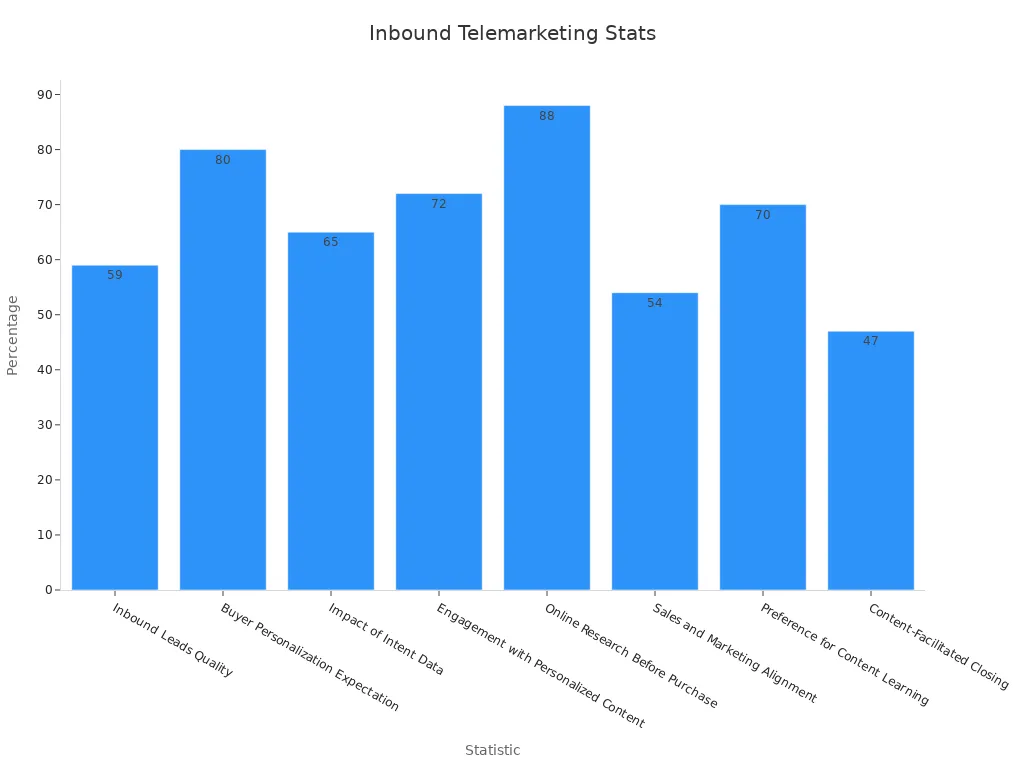
Exploring Outbound Telemarketing
What is Outbound Telemarketing
Outbound telemarketing involves agents proactively reaching out to potential or existing customers. This strategy focuses on promoting products, generating leads, and building customer relationships. Unlike inbound telemarketing, where customers initiate contact, outbound telemarketing allows businesses to take the first step in engaging their audience.
You can use outbound telemarketing to achieve various goals, such as increasing sales, conducting surveys, or scheduling appointments. It remains a powerful tool for businesses aiming to expand their reach and connect with customers directly.
Key Features of Outbound Telemarketing
Outbound telemarketing relies on advanced tools and strategies to maximize efficiency and results. Some of its key features include:
| Feature/Functionality | Description |
|---|---|
| Sales and Telemarketing | Proactively sells products or services while upselling and cross-selling. |
| Lead Generation | Identifies and qualifies potential customers to build a strong sales pipeline. |
| Predictive Dialer | Automates dialing to minimize agent wait time and boost productivity. |
| CRM Integration | Provides real-time access to customer data for personalized interactions. |
| Analytics and Reporting | Tracks performance metrics to optimize campaigns. |
| Call Recording | Ensures quality assurance and supports agent training. |
| Multi-Channel Support | Enables communication through voice, SMS, and other channels for a unified experience. |
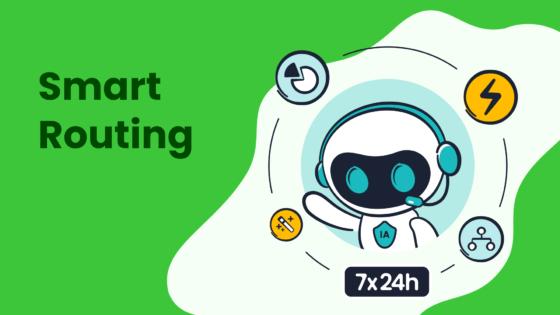
Sobot’s outbound telemarketing call center integrates these features seamlessly. For instance, its predictive dialer and CRM integration help agents focus on meaningful conversations, improving efficiency and customer satisfaction.
Benefits of Outbound Telemarketing for Lead Generation
Outbound telemarketing excels in lead generation by directly connecting businesses with potential customers. It offers a higher conversion rate compared to other marketing channels.
| Marketing Channel | Conversion Rate |
|---|---|
| Telemarketing | 15% |
| Web-based leads | 3% |
| Telemarketing (DMA) | 28% |
| 9% | |
| Direct Mail | 14% |
| Social Media | 13% |
| Telemarketing Call | Up to 12x email |
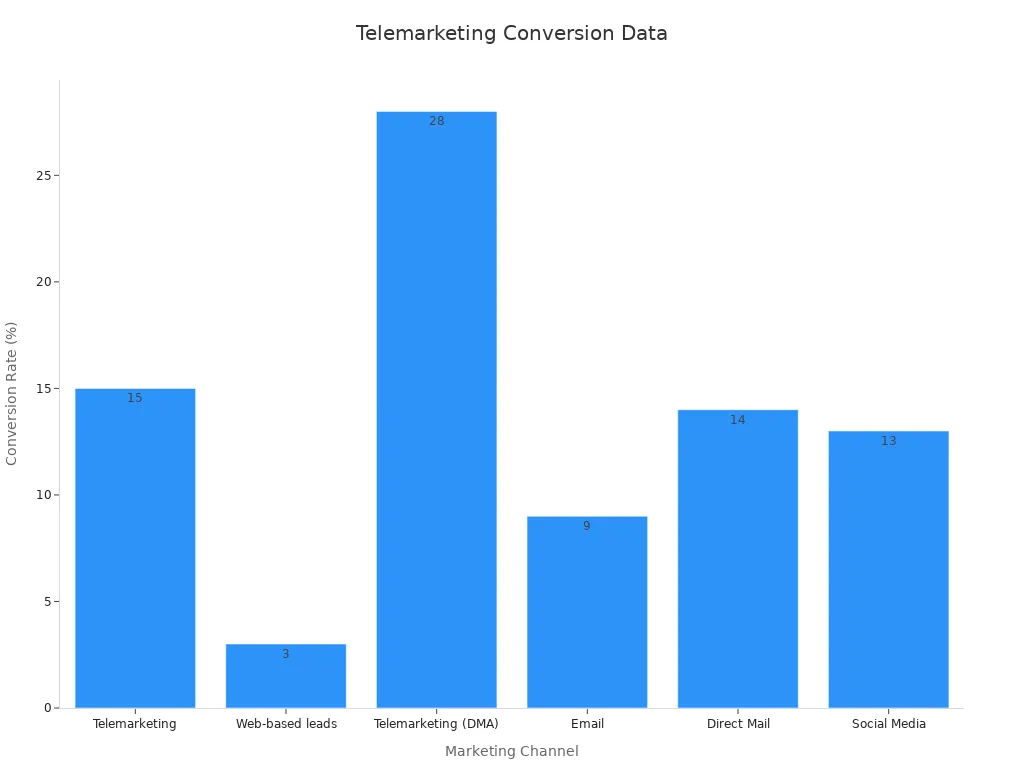
Outbound telemarketing also helps businesses gather valuable insights through surveys and feedback. Sobot’s outbound call centre enhances this process with tools like bulk outbound tasks and real-time analytics. These features allow you to prioritize leads and track campaign performance effectively. By leveraging these capabilities, you can boost your sales pipeline and achieve measurable growth.
Comparing Inbound and Outbound Telemarketing

Key Differences Between Inbound and Outbound Telemarketing
Inbound and outbound telemarketing differ in their approach, goals, and success metrics. Inbound telemarketing focuses on responding to calls initiated by customers, often for support or inquiries. Outbound telemarketing involves agents proactively reaching out to a target audience to promote products or services.
| Aspect | Inbound Telemarketing | Outbound Telemarketing |
|---|---|---|
| Lead Generation | Relies on organic traffic, SEO, and content marketing. | Uses direct outreach like cold calls and emails. |
| Customer Awareness | Leads are often informed and engaged. | Leads might be less aware of your brand. |
| Strategy Type | Long-term, builds brand authority. | Short-term, quick to generate leads. |
| Success Metrics | Customer satisfaction, first-call resolution rate. | Conversion rates, lead generation, revenue growth. |

Sobot’s Voice/Call Center integrates features like intelligent IVR for inbound calls and predictive dialers for outbound campaigns. These tools help businesses optimize both telemarketing strategies effectively.
Use Cases for Inbound and Outbound Telemarketing
Inbound and outbound telemarketing serve distinct purposes, making them suitable for different scenarios.
Inbound Telemarketing Use Cases:
- Handling customer inquiries for e-commerce platforms.
- Providing technical support for software companies.
- Managing reservations for hospitality businesses.
Outbound Telemarketing Use Cases:
- Confirming attendee lists for event management firms.
- Promoting insurance policies for financial service providers.
- Conducting surveys for market research companies.
For example, Sobot’s bulk outbound task feature allows businesses to automate lead prioritization and outreach, making outbound telemarketing more efficient. Similarly, its AI-powered Voicebot enhances inbound telemarketing by providing quick resolutions and personalized interactions.
Choosing Between Inbound and Outbound Telemarketing
Selecting the right telemarketing strategy depends on your business goals and target audience. If your focus is on customer retention and satisfaction, inbound telemarketing is ideal. It builds trust and fosters long-term relationships. On the other hand, outbound telemarketing is better suited for lead generation and revenue growth.
Consider these benchmarks when deciding:
| Metric | Definition | Why It Matters |
|---|---|---|
| Conversion Rate | Percentage of calls leading to desired outcomes. | Indicates effectiveness of scripts and sales pitches. |
| Lead Quality | Likelihood of a lead converting. | Ensures resources focus on high-potential prospects. |
| Customer Retention Rate | Percentage of customers retained over time. | Reflects long-term campaign success. |
| Revenue Generated Per Call | Financial impact metric per call. | Indicates profitability of calls. |
Sobot’s unified telemarketing solutions combine inbound and outbound capabilities, enabling businesses to adapt their strategies based on these metrics. For example, its real-time analytics provide insights into call performance, helping you refine your approach to meet your goals.
The Role of Technology in Telemarketing in 2025
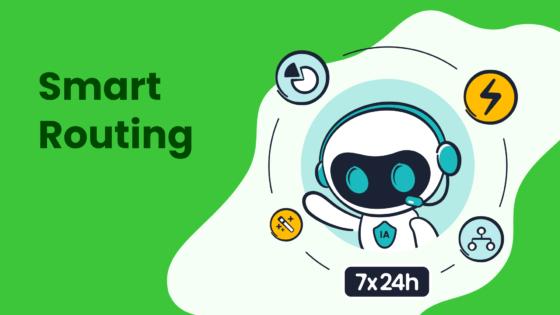
How AI and Automation Are Transforming Telemarketing
AI and automation are reshaping telemarketing by enhancing efficiency and customer satisfaction. These technologies streamline repetitive tasks, allowing agents to focus on complex customer needs. For example, AI-powered tools like predictive dialers optimize outbound telemarketing by identifying the best times to call potential customers. Similarly, AI-driven chatbots handle routine inquiries, ensuring faster resolutions in inbound telemarketing.
By 2025, 80% of customer service organizations will use generative AI to improve productivity and customer experience. Additionally, 62% of companies have already adopted AI technologies, with only 24% in the early stages.
Interactive Voice Response (IVR) systems, powered by AI, are another game-changer. They guide callers through automated menus, reducing wait times and improving call routing. The market for IVR is expected to grow from $5.56 billion in 2024 to $9.26 billion by 2031, with a CAGR of 6.19%.
| Technology | Market Size (2024) | Projected Size (2031) | CAGR (%) |
|---|---|---|---|
| Interactive Voice Response (IVR) | USD 5.56 Billion | USD 9.26 Billion | 6.19% |
Sobot’s AI-powered Voicebot exemplifies how automation enhances telemarketing. It recognizes customer intent, provides instant responses, and reduces the need for human intervention. This not only improves efficiency but also boosts customer satisfaction.
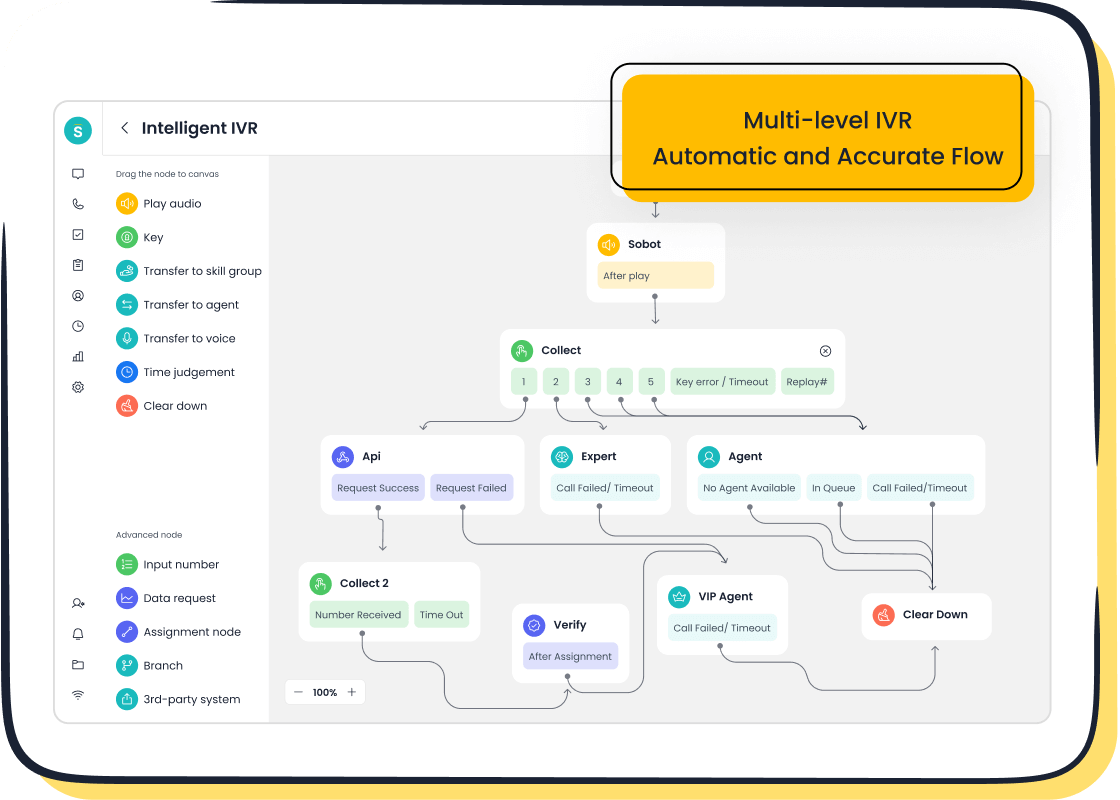
Integrating Inbound and Outbound Telemarketing with Sobot Voice/Call Center
Combining inbound and outbound telemarketing creates a unified strategy that maximizes customer engagement. Sobot Voice/Call Center offers a seamless integration of these approaches, enabling businesses to manage both types of telemarketing from a single platform.
The benefits of this integration are significant. For instance, Sobot’s bulk outbound task feature automates lead prioritization, while its intelligent IVR system ensures efficient call routing for inbound telemarketing. This dual functionality improves operational efficiency and enhances customer experiences.
| Metric | Improvement |
|---|---|
| Reduction in inbound discussion | 20% |
| Positive feedback rate | 96%+ |
| Correct answers by AI platform | 80% |
| Customer satisfaction rate | 95% |
| Self-service question resolution | 22.2% |
| CSAT score | 97% |
| Problem resolution rate | 85% |
| Customer happiness rate | 99% |
| Sign-off rate | 35% increase |
| COD collection rate | 40% increase |
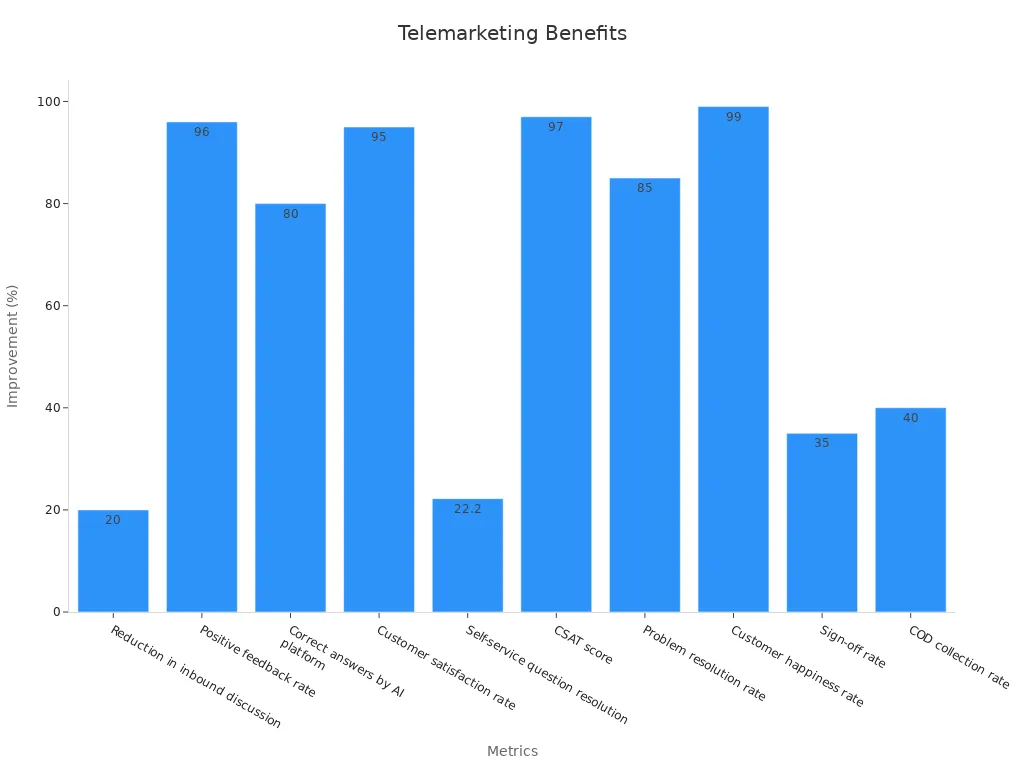
By integrating inbound and outbound telemarketing, you can achieve higher customer satisfaction and better campaign results. Sobot’s real-time analytics further enhance this process by providing actionable insights into call performance and customer behavior.
Emerging Trends in Telemarketing Technology
Telemarketing in 2025 will be shaped by several emerging trends. These advancements aim to improve personalization, efficiency, and customer engagement.
- Personalization at Scale: Data analytics enables customized pitches tailored to individual customer preferences.
- Omnichannel Approach: Telemarketing integrates with digital channels like WhatsApp and SMS for a unified customer experience.
- Advanced Analytics and Reporting: Real-time analytics optimize strategies and improve decision-making.
- Voice and Speech Technology: Natural Language Processing enhances customer interactions.
- Remote and Hybrid Work Models: Cloud technology supports flexible work arrangements.
- AI-Driven Voice Assistants: These tools facilitate intelligent conversations, improving customer interactions.
- Predictive Dialers: AI determines the best times to call, increasing the success rate of outbound telemarketing.
- Real-Time Analytics: These tools analyze calls to enhance performance and understand customer sentiment.
AI will not replace human agents but assist them in tedious tasks, enabling more efficient telemarketing operations.
Big data also plays a crucial role in telemarketing. It helps businesses understand customer behavior and preferences, enabling proactive campaigns. Sobot’s Voice/Call Center leverages these trends to provide cutting-edge solutions that keep your business ahead of the curve.
By adopting these technologies, you can transform your telemarketing strategy, ensuring it remains effective and relevant in 2025.
Optimizing Telemarketing Strategies with Sobot
Leveraging Sobot's Voice/Call Center for Inbound Telemarketing
Sobot's Voice/Call Center offers a robust solution for managing inbound telemarketing. Its advanced features ensure seamless and effective communication with customers. For instance, the intelligent IVR system routes calls efficiently, reducing wait times and improving customer satisfaction. Additionally, real-time analytics provide actionable insights, helping you optimize agent performance and enhance customer experiences.
The platform's scalability allows you to handle thousands of concurrent calls without overwhelming your team. Integration with existing CRM systems ensures agents have access to customer data, enabling personalized interactions. Sobot also supports agent well-being by identifying challenging calls and triggering management support when needed.
| Performance Metric | Description |
|---|---|
| Scalability | Handles thousands of concurrent calls without increasing agent workload. |
| Integration Capabilities | Seamlessly integrates with existing CRM systems. |
| Intelligent Insights Analysis | Captures and analyzes interactions in real time to optimize performance. |
| Personalized Agent Development | Provides individualized feedback and KPI metrics for agent improvement. |
| Predictive Dialing System | Automates bulk calling to connect only answered calls to agents, enhancing efficiency. |
By leveraging these features, you can deliver consistent and personalized customer engagement, ensuring every interaction adds value to your business.
Enhancing Outbound Telemarketing with Sobot's Bulk Outbound Task
Outbound telemarketing becomes more efficient with Sobot's Bulk Outbound Task feature. This tool automates lead prioritization, allowing agents to focus on high-potential prospects. The predictive dialing system minimizes idle time by connecting agents only to answered calls. This ensures effective communication and maximizes productivity.
For example, businesses using Sobot's outbound solutions have reported significant improvements in conversion rates. The platform's ability to analyze call data in real time helps refine scripts and strategies, leading to better outcomes. Whether you're conducting surveys, promoting products, or scheduling appointments, Sobot's tools streamline the process and enhance results.
Unified Solutions for Telemarketing Success
Combining inbound and outbound telemarketing strategies creates a unified approach that drives success. Sobot's Voice/Call Center integrates both functionalities, enabling you to manage all telemarketing activities from a single platform.
To optimize your strategy:
- Define your goals, such as increasing first-call resolutions or reducing response times.
- Choose the right tools, like Sobot's CRM integration and AI-powered Voicebot, to enhance efficiency.
- Train your team to deliver exceptional service.
- Measure KPIs, such as customer satisfaction scores and average handling time, to identify areas for improvement.
This unified approach ensures consistent customer engagement and effective communication across all channels, helping you achieve measurable growth.
Inbound telemarketing focuses on responding to customer needs, while outbound telemarketing proactively creates sales opportunities. Both strategies offer unique benefits. Inbound telemarketing builds trust and improves customer satisfaction. Outbound telemarketing drives lead generation and boosts revenue.
| Benefit | Statistic |
|---|---|
| Conversion Rates | 10% to 25% improvement in conversions |
| Revenue Generation | Contributes about 40% of total sales revenue |
| Lead Qualification | 58% of sales professionals value telemarketing |
| Customer Retention | Increases retention rates by 15-30% |
| Cross-Selling and Upselling | Revenues increased by 20-30% |
| Personalisation | 72% of consumers respond positively to calls |
Sobot’s Voice/Call Center combines inbound and outbound telemarketing tools, helping you achieve these benefits. Evaluate your goals and choose the strategy that aligns with your business needs. With Sobot’s solutions, you can optimize telemarketing and drive measurable growth.
FAQ
What is telemarketing, and why is it important in 2025?
Telemarketing involves using phone calls to connect with customers for sales, support, or promotions. In 2025, it remains vital due to its ability to create direct, personalized interactions. Businesses use telemarketing to generate leads, improve customer satisfaction, and boost revenue.
How does technology enhance telemarketing strategies?
Technology like AI and automation improves telemarketing by streamlining tasks, analyzing data, and enhancing customer interactions. Tools such as predictive dialers and intelligent IVR systems help businesses save time and increase efficiency. Sobot’s Voice/Call Center integrates these technologies for better results.
Can telemarketing work for small businesses?
Yes, telemarketing benefits businesses of all sizes. Small businesses can use it to reach new customers, promote products, and gather feedback. Sobot’s scalable solutions, like its bulk outbound task feature, make telemarketing accessible and effective for smaller teams.
What are the key metrics to measure telemarketing success?
Key metrics include conversion rates, customer satisfaction scores, and revenue per call. These indicators help you evaluate the effectiveness of your telemarketing campaigns. Sobot’s real-time analytics provide actionable insights to optimize performance.
How does Sobot support telemarketing efforts?
Sobot offers advanced tools like AI-powered Voicebots, predictive dialers, and CRM integration. These features enhance both inbound and outbound telemarketing. Businesses using Sobot report higher efficiency, better customer satisfaction, and improved lead generation.
See Also
Best Reviewed Contact Center Solutions for the Year 2024
Leading Cloud Contact Center Solutions to Consider in 2024
Comprehensive Guide to Omnichannel Call Center Software
